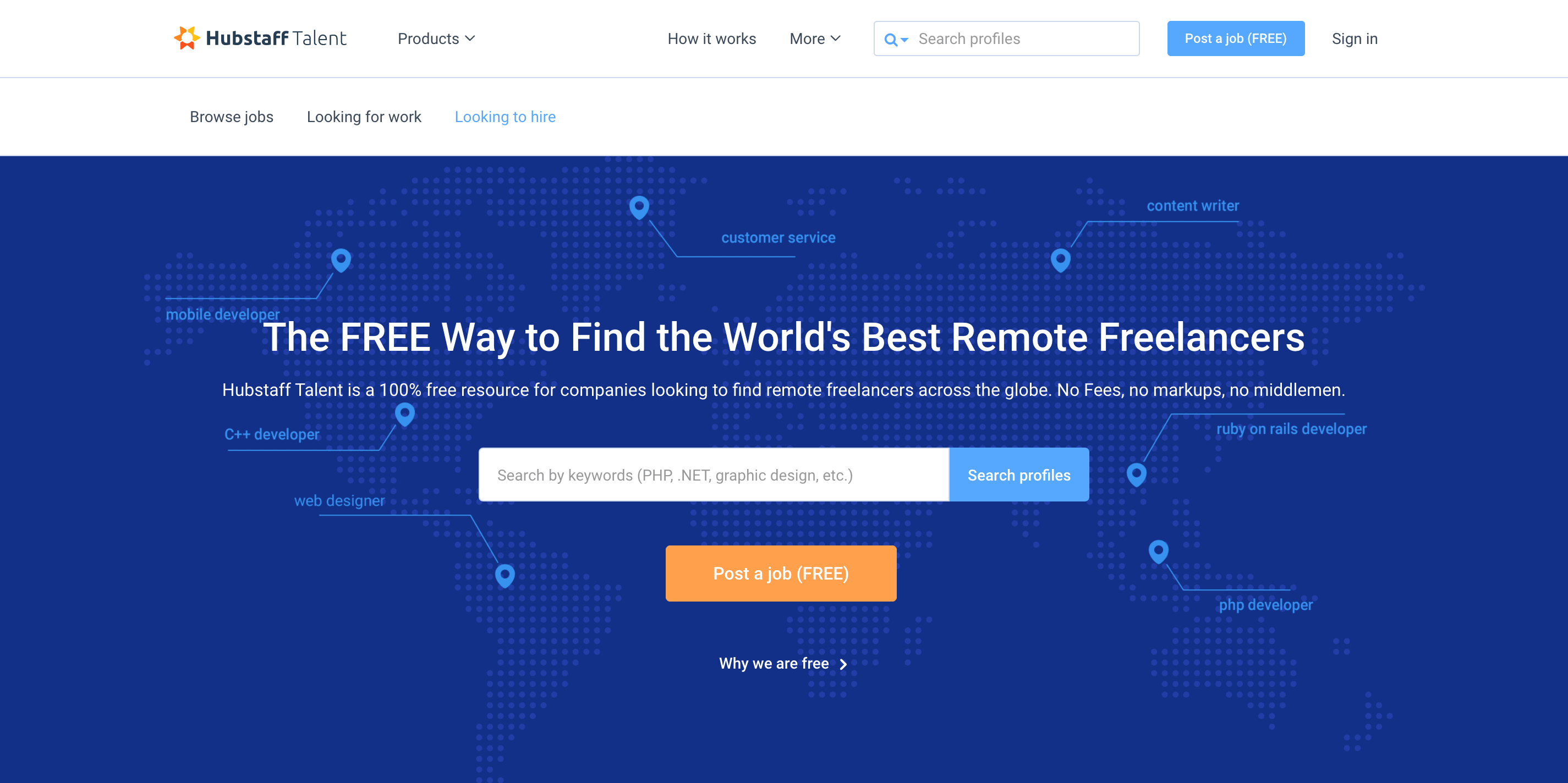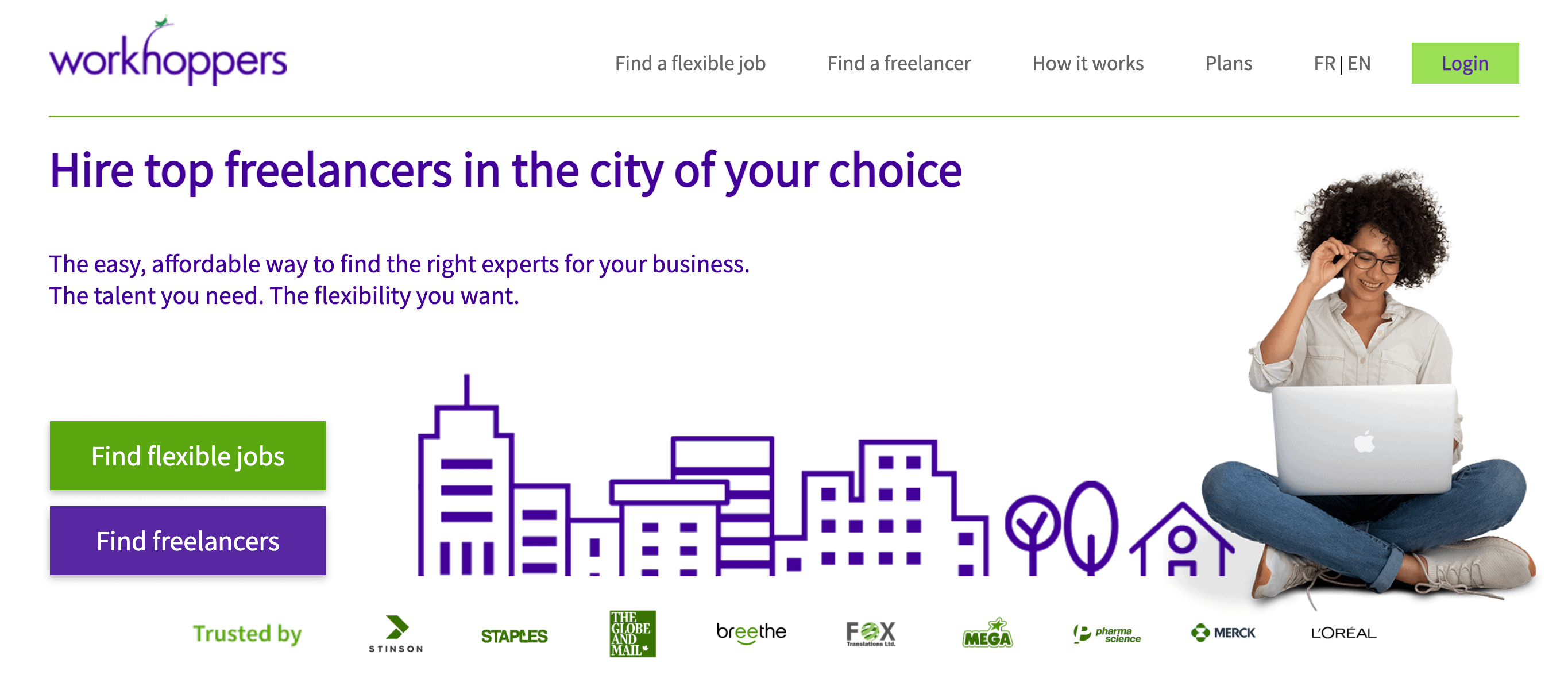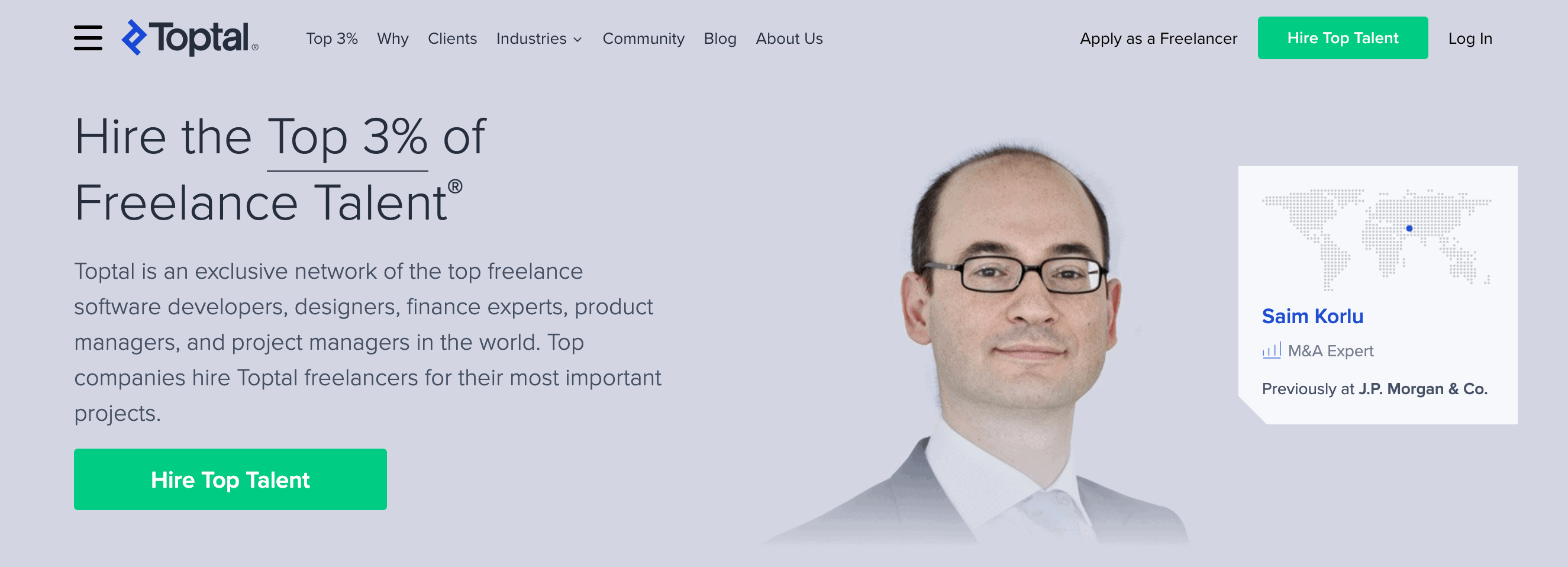Upwork is one of the top freelancing and remote work platforms that businesses consider when hiring a contractor or getting short-term help. The platform has scaled for businesses of all sizes, though many feel its fees and costs have also scaled.
While being enormous makes it popular, Upwork has also proven that its model has worked for more than a decade. That means many competitors have popped up over the years and are angling for their own base of companies and freelancers.
When size becomes a weakness, sharks swarm. If you’re looking for one of these new fish, here are a few leading Upwork alternatives to consider.
Boost your team’s efficiency with Hubstaff's productivity tools
Try it free for 14 daysWhy you should use an alternative to Upwork
Posting a job on Upwork can be a hassle.
The sheer number of applicants to any job can be overwhelming, and some applicants will mass-apply to jobs they aren’t qualified for. Sorting through irrelevant responses can be a job alone.
Yes, Upwork has a rating system for freelancers. Still, that rating system doesn’t show how readily a freelancer communicates and other essential work habits you should observe before hiring someone. Plus, the system benefits those on the platform longer, so you may overlook great freelancers just because they’re new to Upwork.
Upwork’s messaging platform and payment systems are cumbersome and rife with bugs. Communicating — especially with multiple freelancers — can be a giant pain.
Hiring and working with freelancers through the platform can also be quite costly. (In fact, we save over $30,000 every year by not using Upwork.)
Upwork may be the biggest name in the game, but many competitors do the job without the downsides. Whether you want an alternative platform or an in-house process to find and hire content creators, we’ve got you covered. Here are some of our favorite tools and websites like Upwork.
Sites like Upwork:
- Fiverr
- Hubstaff Talent
- Credo
- Freelancer
- Gun.io
- Textbroker
- Workhoppers
- FreeUp
- PeoplePerHour
- Guru
- 99designs
- Toptal
The best Upwork competitors and alternatives
1. Fiverr

Fiverr is the world’s largest online marketplace for on-demand freelance services. They initially offered $5 services, but that has since changed.
You can find about any service you want for five bucks or more, including users who will design a t-shirt, prank call someone, beatbox your name, and many other wild services.
What makes it different from Upwork?
- You can post a project or browse gig offers to find something that fits your requirements.
- Fiverr is best for specific gigs with predetermined outcomes.
- High-rated sellers and Pro-level providers charge way more than just $5. Expect to get what you pay for.
- Creating an account is free, and you can communicate with the freelancer before placing an order with them.
- Fiverr is better suited for people who want a gig completed quickly and within a small budget.
- As mentioned above, it covers diverse services and is less focused than other platforms.
If you want to accomplish a quick, clear-cut job that you know is easy to hand off, Fiverr might be worth a look. That said, it does have its fair share of shortcomings. Fiverr won’t always yield a high-quality outcome for you or your business compared to competitors. Buyers’ options are limited as most power is in the seller’s hands.
Is Fiverr better than Upwork?
Although Fiverr is an Upwork competitor, it has a very different business model and is suitable for various projects for which you would only sometimes use Upwork. The most straightforward comparison of the two is based on the size of your operation and jobs.
Broadly speaking, Upwork is a better option for large projects or for establishing long-term relationships with freelancers or businesses.
Fiverr is a good option for small jobs that don’t repeat and don’t require a lot of interaction or revision. One worry is that many freelancers express concerns about Fiverr’s dispute process — where it is easy for them to submit some work but have a client cancel before the work is finished and receive no payment at all. This may mean that your best talent isn’t always available on Fiverr.
If you have an immediate need or want to find someone to hire right away, Fiverr is likely better than Upwork. If your project is ongoing and you want bids to review portfolios, Upwork is likely a more reliable option than Fiverr.
2. Hubstaff Talent (100% free)

Hubstaff Talent connects freelance professionals and clients with efficiency and finesse.
This free platform displays a freelancer’s hourly rate, skills, experience, availability, résumé, and languages spoken. Freelancers can also add a short description to provide more information about themselves.
You can filter profiles by skill, availability, years of experience, or country. You can also run a search for keywords or phrases.
For business owners to find freelancers and agencies, they simply have to browse the profiles on Hubstaff Talent, contact their chosen freelancers directly, decide on work terms, and get started.
Agencies can start profiles and add team members to be found by business owners. Freelancers only need to create profiles, get found and contacted, and then hit the ground running.
Here’s what makes Hubstaff Talent different as an Upwork competitor.
- It’s a free directory for companies looking for remote talent globally.
- There are no markups or fees on either side (freelancer or business owner). That means freelancers get what their client pays them.
- Because there are no fees, Hubstaff Talent takes a minimal role in the pairing and agreements between clients and talent.
- There are no fees levied on projects or hourly work.
- Employers are free to contact freelancers, interview them, and hire them at no charge.
- You can also add Hubstaff time tracking software, which includes invoicing and payroll options via PayPal, Bitwage, and Payoneer.
- Hubstaff’s time tracking and team management plans start at $7 for a single user per month.
The freelancer management app that saves $170,000/year
Save a ton of time and money by tracking time and paying freelancers with Hubstaff.

3. Credo

One of the biggest problems with freelance marketplaces is that you just have to trust freelancers who say they’re good at what they do.
You can check their portfolios, but that’s not always a great indication of the quality of their work. Credo aims to solve that issue by vetting their providers before listing them on the site.
Unlike many freelance marketplaces, Credo specializes in a very narrow field: SEO and digital marketing. When looking for an Upwork alternative for agencies and marketing work only, sites like Credo give you a great way to prioritize experts and avoid a sea of irrelevant pitches and messages.
When you land on the Credo site, you can choose from a list of services you’re interested in, including:
- SEO consulting
- SEO site audits
- Content marketing
- Inbound marketing
- Link building
- Facebook ads
- PPC
- Paid social ads
- Online reputation management
- WordPress development
Once you’ve done that, you’ll see a list of providers you can choose from. And because the founder of Credo has closely vetted those providers, you can be confident that you’re getting top-notch talent for your project.
How does Credo compare to Upwork?
Credo has more vetting than Upwork, which can simplify your efforts in locating very specific talent. However, this may be an option when you need a full-service provider, not just an Upwork alternative for writer gigs.
Here are a few other essential distinctions:
- The Credo process is more like a concierge service that guides you throughout your project.
- They vet every agency and consultant in their network.
- The Credo team contacts you to make recommendations and introductions within 24 hours.
- Credo reaches out to potential agencies and freelancers who are the best fit.
- Credo helps with project proposal reviews and clarifications and then checks in occasionally to ensure the project progresses well.
4. Freelancer

With over 20 million projects posted and over 50 million users, Freelancer is a massive and constantly growing Upwork alternative offering similar benefits.
For employers and small businesses, signing up and getting started on Freelancer is quick and easy. To get started, you post a project, fill out project details, add job skills and pricing options, and attach project files for applicants to peruse.
Alternatively, employers can contact a freelancer they find attractive for the job.
Once you submit your job, freelancers will bid on your project. Once the project is completed, businesses can rate and review their freelancer.
Freelancer.com and Upwork offer very similar offerings. The only significant differences are pricing, access to tools at the subscription level, and the quality of the tools they provide.
Here are some key differences to note with this Upwork competitor.
- Pricing on Freelancer.com varies from $3 to 3% of the project cost, depending on which is greater. You can purchase updates at an extra cost for things like priority, full-time work, NDA, etc. When you hire on Upwork, you pay a 5% Client Marketplace Fee on all payments made to freelancers for fixed-price and hourly jobs.
- Contests allow you to assign freelancers projects and pick a winner. While it is free to post a contest, you will need to provide prize money. You can also add upgrades to extend the contest, assign priority, NDA, etc. One big downside of hosting a contest is that many freelancers don’t enter because they don’t want to create spec work for free.
- Don’t wish to manage your projects? You can consider adding a project manager to your project. However, fees will differ depending on the size of the project.
Save time, money, and energy when you manage freelancers with Hubstaff
Try the freelancer management app that saves $170,000/year

5. Gun.io
Sometimes, you have a very specific business need. If you need an Upwork alternative for developers today, add Gun.io to your list.
Gun.io takes pride in being a close-knit network of talent that the company reviews. Developers and programmers must be approved to get added to the talent pool at Gun.io, which weeds out many low-quality pitches for jobs and services.
Typically, this means you’re only looking at developers with top skills and experience, deep portfolios, and past work that matches your project’s details. Gun.io’s exclusivity offers some comfort when you know the outcome you want but don’t necessarily speak the language of programmers for how to achieve those aims.
With Gun.io, you get support during the entire process. After creating a job on its platform, the Gun.io team will use your unique parameters to match with available, vetted talent within 24 hours. You pick who you’d like to interview, and Gun.io facilitates live meetings between you, the developer, and a Gun.io representative.
You’ve got options to choose retainers, buy a slot of hours, contract-to-hire, and direct hire developers.
When comparing it as an Upwork alternative for developers, here are a few things to consider:
- Gun.io has vetted talent, but is more expensive. You’re often looking at $75 to $150 per hour for top talent.
- Overall costs can be difficult to understand before you hire because Gun.io has custom pricing based on the work and type of agreement. The good thing is that you’ll get an estimate for the total cost before you hire.
- Top-line fees are on par with Upwork, with you paying a 20% fee if you do a direct hire on the platform. However, Upwork may have lower costs for smaller projects.
- Upwork offers more flexibility in job types and pricing. You’ll have a larger talent pool but will either need to sort through an extensive list of contractors that apply or pay Upwork to do some of that concierge service for you.
6. Textbroker

If you’re looking for an Upwork alternative for writer and editor skills on the cheap side of things, Textbroker could work for you. Like Fiverr, this site is an Upwork alternative but runs things differently.
Textbroker guarantees your work gets done — even if your writer gets sick, can’t complete the job, or simply decides not to. This comes from its use of individuals for projects as well as a pool of writers. Textbroker pays its writers between 1.1 and 5.5 cents per word based on the project and how their internal editors score work. That rate makes it a viable alternative for entry-level writing and small tasks. But, it likely won’t give you high-quality work to create a complete marketing campaign or ghostwrite something for your executives.
How does Textbroker compare as an alternative to Upwork? Here are a few differences.
- This site focuses purely on freelance writing services.
- You create an account and get to select your order type and quality level, as well as set up instructions.
- You get access to thousands of writers from all over the world, with different skill levels based on their star ratings.
- You can then deposit funds to place the order.
- You get to decide who writes the article and the delivery dates.
- Alternatively, you can use the Managed Service option, which starts at $2500. In this option, a team handles the entire process for you.
- Textbroker’s API makes integration with your CRM or CMS easy.
Buyers post content requests, and the site matches the request to one of its thousands of writers. Writers are categorized by skill level, and the pricing matches, so buyers choose the quality level they want from their writer and move forward.
The downside to Textbroker is that communication with your freelancer is limited. And, again, you get what you pay for, so if you choose a lower-quality content writer to complete your task, you’re likely to get low-quality work.
While the site boasts some high-quality writers, you may be better off forming more personable relationships with writers directly, especially since content is such a nebulous field with many gray areas.
Based on the costs on its website, the bulk of your payments go to the service and not the writers, so keep that in mind when judging the expected quality of the deliverable.
7. Workhoppers

Workhoppers is the anti-thesis of Upwork-type freelance sites and was designed for companies to find and hire professionals in their city. It relies on a local set of talent and AI tools to automate matching for your job.
How is Workhopper different from Upwork?
- No commissions are paid. Instead, you’ll pay a monthly plan starting at $59 per month.
- Find freelancers in your local area for full-time, part-time, or contract roles.
- A matching algorithm provides a curated list of potential candidates instead of requiring people to apply or hunt them down.
- You save time by contacting candidates directly and immediately.
- You get to negotiate terms with the candidate, saving time and money.
With Workhoppers, there is no bidding or complicated processes for estimating the cost of a project within the platform. This is a connection tool, and you work out the details afterward.
Workhoppers believe in the advantages of working face-to-face, even if it’s just once a month over a coffee. Companies and “workhoppers” can communicate directly and agree together on the terms of the contract. It uses a robust matching algorithm to highlight the most qualified freelancers. That means you don’t have to go through the sorting process.
Once the job is completed, businesses can review their freelancer. All companies and jobs are vetted before they can post to the site.
The site intends to encourage companies to hire and meet with freelancers in their communities. This focus on long-term relationships is better for everyone.
The downside of Workhoppers is that, depending on where you live, the cost of a local freelancer could be higher. It was also very popular during the pandemic but seems to have fewer reviews and changed talent locations in recent years.
You can specify that you are seeking a freelancer in another city, but you’ll need to establish trust since there is no escrow payment processing. The site is an excellent option for projects that require meeting face-to-face.
8. FreeUp

FreeUp is an Upwork competitor designed to help businesses quickly access top talent. That platform evolved from a freelancer vetting service to a place to post and manage jobs across a wide range of industries and locations.
The rates you pay depend on the freelancer’s experience and location, but FreeUp provides many details and examples, so you should know what a qualified freelancer costs before starting any job.
How is FreeUp different from Upwork?
- First off, it is not a job-matching board.
- The candidates available possess various skill sets, not limited to one focus area.
- As part of building its talent pool, FreeUp vets candidates for you based on skills, attitude, and communication. They only allow the top 1% into the network.
- They offer one to three handpicked, pre-vetted candidates based on your work request, usually within 24 hours.
- When candidates require specific knowledge or software expertise, FreeUp will recruit and interview for you outside their marketplace at no cost.
- Once introductions to potential candidates have been made, you can communicate with them via business email, Skype, or phone.
- FreeUp handles weekly freelancer payments via credit card, PayPal retainer, and ACH for U.S. clients.
- There are no sign-up fees or monthly fees. They make money off the difference in the hourly rate.
Again, paying your freelancers directly can save you thousands of dollars. Freelancers are only given assigned work after their hours have been approved.
When it comes to suggested candidates, you have no obligation to hire them. Instead, you can provide feedback to FreeUp to help find candidates that would best suit your project or work requirements.
Easy freelancer payments. No headaches.
Track time, boost productivity, send payments and more with Hubstaff.

9. PeoplePerHour

PeoplePerHour is a UK-based Upwork competitor that offers a trusted dynamic platform where you can post a job and have freelancers apply. However, it also offers popular requests at a fixed price. Freelancers define these requests (known as hourlies) and their prices.
In what other ways does PeoplePerHour differ as an Upwork competitor?
- It is free to set up an account.
- Posting a Job on PPH is free. However, there is a fee for featuring your job listing.
- Freelancer fees are substantially high, but buyers often have lower fees. You’ll be charged 10% + £0.60 of the total amount you’re paying or of the deposit.
- You can browse “Hourlies,” which are fixed-price offers that freelancers can start immediately.
- Alternatively, you could post a job and let freelancers in the PeoplePerHour community find you.
- Another way to get started is to search the profiles of freelancers and contact them directly.
- The “WorkStream” in your PeoplePerHour account is a single dashboard that enables you to track activity, communicate, and manage payments.
10. Guru

There are still plenty more websites like Upwork to review. Next on our list is Guru.
Guru provides freelancers and employers with a straightforward experience when finding or posting jobs. Thanks to its security features and relatively low fees, the platform boasts a 99% customer satisfaction rate — an impressive number.
Here’s what makes Guru a notable Upwork alternative.
- Signing up and posting a job is free.
- You can jump straight into several freelancing job categories, such as sales, development, and writing.
- You have four payment terms: fixed, hourly, task-based, and recurring.
- The SafePay feature provides payment security by assuring freelancers that funds are available.
- Like with Upwork, Guru freelancers can use credits—called Bids—to apply for jobs. With the free membership, they receive 10 bids every month.
- Freelancers working on the same project can collaborate through WorkRooms, Guru’s built-in collaboration spaces.
- Employers can post unlimited jobs and use SafePay and WorkRooms at zero cost.
Freelancers can use Guru for free, but it also has a paid membership that unlocks additional benefits. This includes more bids, lower job fees, and the ability to message employers directly.
Guru charges employers a 2.9% handling fee for every invoicing transaction. You can get a 100% cashback by paying via wire transfer or eCheck, Guru’s in-app wallet. The company has also added an auto-pay feature that automatically pays freelancers to prevent disruptions, which freelancers and businesses say has protected their reputation on the platform.
You’ll also find some of the best enterprise-level support here among our websites like Upwork, with features that smooth over every part of the job posting, vetting, hiring, paying, and finalizing.
11. 99designs

99designs doesn’t bill itself as a “freelance marketplace” like the other platforms on this list but performs the same core function. However, 99designs focuses exclusively on graphic design services and has gained recognition as one of the best ones in that regard.
What makes 99designs stand out?
- The platform lets you select from several design templates for logos, web pages, book covers, and more.
- There are two ways to get your projects done:
- You can provide 99Designs with your design needs, budget, and deadlines. They will then find a designer to do the job while you wait.
- You can directly contact designers through the platform and negotiate and collaborate with them.
- You’ll be able to view portfolios, which gives you an idea of a designer’s capabilities before hiring them. An experienced designer will have a strong creative portfolio that showcases unique skills, creativity, and style.
- They offer a premium service called Studios, which is aimed at projects that require creative campaigns instead of design pieces.
- 99designs performs quality checks on designer submissions to an extent before presenting them to you. This means that you can expect quality work virtually every time.
- Vista powers the platform, so it’s easy to turn designs into printed or other physical materials.
Like Freelancer.com, 99designs allows you to host your own contests.
You will submit project specifications, choose a prize from 99designs’s pricing packages, and receive submissions from several competing designers. The award goes to the author of the design you select (i.e., the “winner” of the contest).
99designs charges fees based on designer and service levels, with rates depending on the type of work you need done. Logo design pricing, for example, ranges from a flat $299 to $1,299. Designers themselves pay a percentage rate back to 99designs.
12. Toptal

Toptal is short for “top talent,” which should give you an idea of what they stand for. Of the many freelancer applications they receive per month, they hire less than 3%. This demanding screening process ensures that only the highest-quality freelance talent will work on your projects.
Why should you consider Toptal as a good alternative to Upwork?
- Toptal’s application process essentially eliminates the possibility of working with underqualified freelancers.
- You can assemble a team of project managers, designers, and developers on the platform.
- Toptal has freelancers specializing in various industries ranging from health care to entertainment.
- Unlike in other freelancing platforms, you cannot browse freelancer profiles. Toptal will do the matchmaking for you based on your needs.
Is Toptal better than Upwork?
One can argue that Toptal is the polar opposite of Upwork and Fiverr. While Fiverr and other freelancing platforms connect freelancers with clients who just need one-time jobs done, Toptal is for clients looking to work with specialists in a more steady capacity. That said, Toptal isn’t the best option unless you’re one of the latter.
This makes Toptal one of the best Upwork alternatives when you have a large budget, long needs, and substantial demands. When you have less time to sort through pitches and resumes, think of it as your way to create lasting relationships with great talent.
If you’ve got a lower budget or more time, Upwork may make more sense.
While Toptal doesn’t provide pricing information on its website, many review sites agree that it charges more expensive fees than its counterparts. Typically, reports say you should expect $50 to $150+ per hour for development professionals, for example.
Toptal’s value stands out when you need to complete a complex project immediately but don’t have time to hire and onboard new employees. You might want to look elsewhere if you’re looking for quick, affordable, one-time jobs.
Consider a comprehensive team management platform
In addition to Hubstaff Talent, you can manage your team’s time and projects with Hubstaff.
Hubstaff time tracking allows you to add skilled freelancers and contractors to easily track their work hours and get paid quickly and accurately. Teams in e-commerce, software development, staffing, and recruitment also use Hubstaff to work efficiently daily.
Hubstaff offers Agile project management features that use visual project boards and detailed tasks to keep your team on the same page. Assign tasks to quality freelancers and contractors and get progress updates as they work on projects.
Plan Sprints, automate workflows, and set deadlines so that handing off projects to outside professionals is easy and streamlined.
Pick multiple Upwork alternatives
No matter which Upwork alternatives you choose to work with, remember that you need a reliable solution to manage your team of quality freelancers or remote teams. Using time tracking software for agencies can significantly enhance your management capabilities. Many Upwork options outlined above are enticing, but remember that you can choose the best Upwork alternative for your business.
One of the best ways to protect your business is to use different options and agencies for different projects. This gives you experience managing such relationships and protects your company against low-quality work or people ghosting you after a project starts.
And when you find great talent, bring them into your tools like Hubstaff. Our workforce analytics platform lets you understand how these freelancers work and see where you get the most value for your money.
We originally created this post in March 2016. Hubstaff freelancing experts update it regularly with the latest pricing, service, and package details, often adding and removing options from the list. Our most recent update occurred in May 2024 to ensure accuracy and include more relevant platforms.
Subscribe to the Hubstaff blog for more posts like this
Most popular
How to Calculate a Raise: Practical Guide for Employers
By 2030, the US alone will lose $430 billion annually due to low talent retention — and a lot of this turnover stems from low pa...
How to Survive and Thrive in an 80-Hour Work Week
It’s hard to believe that only a century ago, the 80-hour work week was the norm in the United States. Then, in 1926, the Ford M...
Mastering Workforce Scheduling: Techniques and Tools for Success
Imagine a workday where scheduling your workforce effectively ensures that every shift is perfectly aligned with your business nee...
Top Time Trackers for Virtual Assistants: Enhance Efficiency and Accountability
Virtual assistants (VAs) have a lot of responsibilities — and so do the people who hire them. With so much to keep track of, a t...





